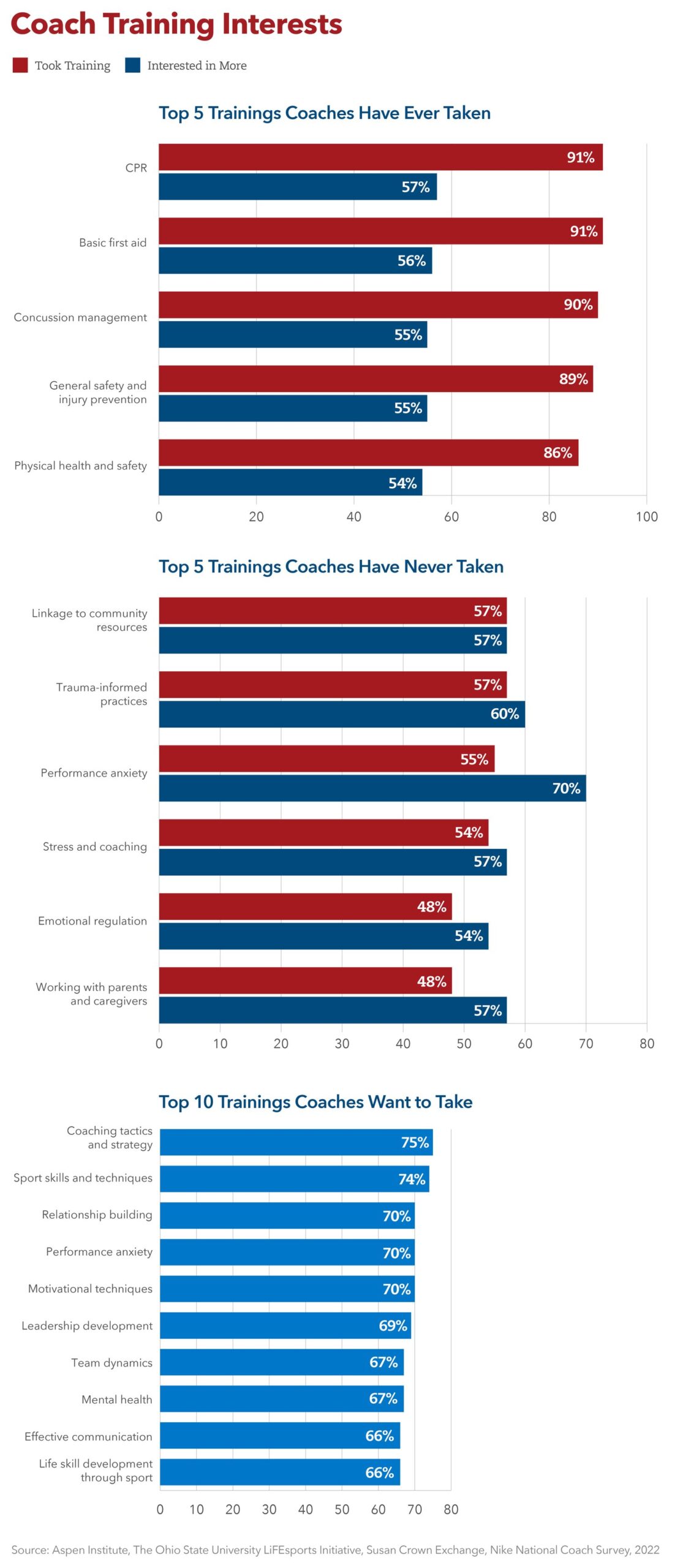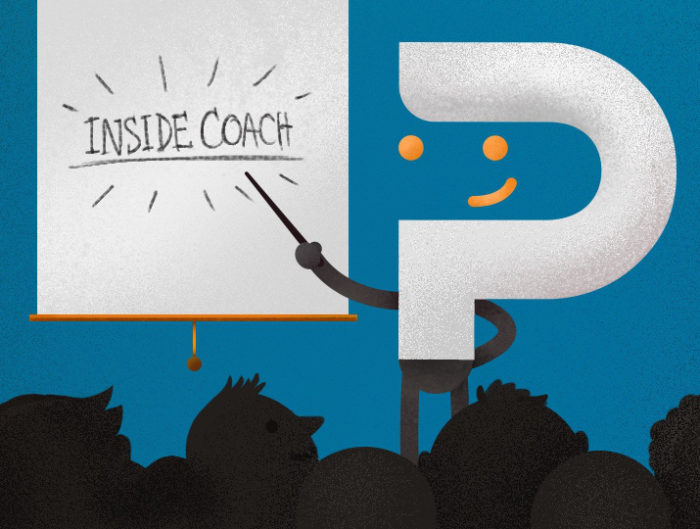As a youth sports coach, you want the best for your players. You work hard to teach them the skills they need to succeed on the field, foster a positive team environment, and promote good sportsmanship. But have you ever felt unsure about how to address the mental health of your athletes? Well, according to the 2022 State of Play Annual Report by the Aspen Institute, you’re not alone.
The National Coach Survey, which analyzed coaching behaviors, experiences, and needs in over 10,000 coaches across the United States, found that while almost all coaches feel confident in their ability to coach X’s and O’s, many coaches feel significantly less confident when it comes to the mental aspects of sports.
In fact, only 18% of coaches surveyed reported feeling highly confident in their ability to link athletes to mental health resources. This was coaches’ second least-confident behavior, right behind helping athletes navigate social media pressures. Few coaches felt confident in identifying off-field stressors for athletes (19%) and referring athletes to support (18%). This is a worrying trend, especially given the rise in mental health challenges among young athletes.
Coaches need and want more help addressing the mental health of players.
This trend highlights the need for more resources and support for coaches in addressing the mental health of their players. Beyond sports skills and strategy, coaches expressed interest in more training on relationship building (70%), performance anxiety (70%), motivational techniques (70%), leadership development (69%), team dynamics (67%), and mental health (67%).

Here are 5 tips and resources for things that are within your control to positively impact your players’ mental health and wellbeing.
1. Educate yourself.
As a coach, one of the most important things you can do to support your players’ mental health is to educate yourself. Take the time to learn about the common mental health challenges that athletes face, and gain knowledge and skills related to supporting your players’ mental health and wellbeing.
There are many resources available to help you learn more about mental health, including online courses, workshops, books, and podcasts. Here are a few examples of workshops and courses that may be available to you:
- Mental Health First Aid: This is an 8-hour course that provides coaches with the skills to identify, understand, and respond to signs of mental health and substance use disorders.
- Positive Coaching Alliance Workshops: The Positive Coaching Alliance offers workshops that focus on creating a positive and supportive environment for athletes. Topics covered include building team culture, communication skill development, establishing a growth mindset, and developing character.
- Udemy Online Courses: Udemy is a platform that hosts over 155,000 courses, with topics relevant to sports psychology and coaching. It offers courses on-demand, meaning that you can enroll and start learning at any time. Udemy courses are created and taught by instructors from all over the world.
- Coursera Online Courses: Coursera partners with over 200 top universities and organizations to provide access to over 4,000 courses and training programs. It offers courses on various topics, including sports psychology, leadership, and coaching, among others. Coursera courses are typically more structured and are taught by university professors and experts in their respective fields.
- The Sports Psych Show with Dan Abrahams: This is an excellent resource for youth sports coaches looking to enhance their knowledge of the mental aspects of sports. Through the podcast, coaches can gain valuable insights and practical tips on how to help their athletes overcome challenges such as anxiety, confidence issues, and negative self-talk.
2. Create a safe team environment.
Creating a safe team environment is essential for supporting your players’ mental health and wellbeing. As a coach, you can take steps to promote a safe and positive team culture, including:
- Use Active Listening: Coaches can use active listening skills such as summarizing, clarifying, and reflecting back to show their athletes that they are paying attention and understand what they are saying.
- Emphasize Teamwork: Emphasize the importance of teamwork and collaboration, and encourage your players to support each other. Foster a sense of community and belonging by creating team-building activities and opportunities for players to get to know each other
- Address Bullying and Harassment: Take steps to address any instances of bullying or harassment on your team. Create a safe reporting mechanism for players to report incidents, and take swift action to address the behavior and support any players who have been affected.
3. Encourage open communication.
Stigma surrounding mental health can make it difficult for athletes to discuss their struggles openly. However, as a coach, you can help break down this stigma by encouraging your athletes to talk about mental health openly. Some ways to do this include:
- Check-in Regularly: Coaches can check in with their athletes regularly and encourage their athletes to talk about their mental well-being in the same way they talk about their physical health.
- Create Team-Building Activities: You can also encourage your athletes to share their thoughts and emotions with each other by creating team-building activities that focus on communication and trust.
- Share Experiences: One way to promote open discussion is by sharing your own experiences with mental health or bringing in guest speakers who can share their experiences. This can help normalize the conversation and make it easier for athletes to talk about their own struggles.
4. Refer athletes to support services.
As a coach, it’s important to recognize when an athlete may need additional support beyond what you can provide. In these situations, it’s important to refer them to appropriate support services.
- Refer them to Specialized Organizations: Organizations that specialize in mental health services for athletes, such as the Association for Applied Sport Psychology or the Mental Health in Sport Working Group. Coaches can reach out to these organizations for information and referrals.
- Directly Refer them to Mental Health Professionals: Coaches can reach out to mental health professionals directly, such as therapists or counselors who specialize in working with athletes. They can search for providers in their area using online directories such as Psychology Today or GoodTherapy.
- Work through Team Physicians: Team physicians or other healthcare professionals who work within your organization may be able to provide referrals to mental health resources.
When referring athletes to support services, it’s important to approach the conversation with sensitivity and empathy. You can start by asking your athlete if they would be open to talking to a professional about their concerns, and assure them that seeking help is a sign of strength. Remember to follow up with your athlete after they have received support to see how they are doing and offer ongoing support as needed.
5. Promote a culture of self-care.
- Emphasize Rest and Recovery: Coaches can educate their athletes on the importance of rest and recovery in preventing burnout and promoting overall well-being. This can include encouraging athletes to take time off when needed, prioritize sleep, and engage in activities that promote relaxation and stress relief.
- Practice Mental Skills Training: Coaches can teach their athletes mindfulness and relaxation techniques to help manage stress and anxiety. This can include breathing exercises, visualization, and progressive muscle relaxation.
- Encourage Athletes to Eat Healthy: Coaches can promote healthy eating habits and proper hydration to support physical and mental health. This includes encouraging athletes to consume nutrient-dense foods, stay hydrated, and avoid excessive amounts of caffeine or other stimulants.

 FRA
FRA































